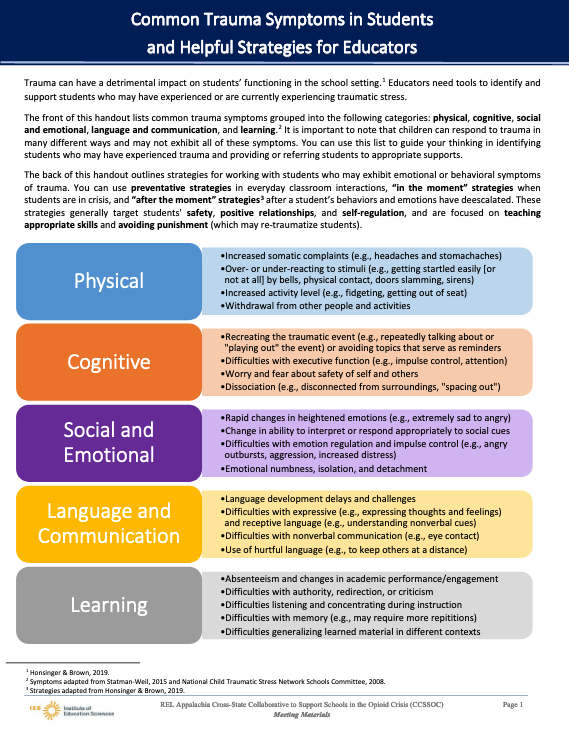Many educators are seeking guidance to support students who have experienced trauma, particularly related to the opioid crisis. This resource was co-developed by the REL AP team and the Cross-State Collaborative to Support Schools in the Opioid Crisis (CCSSOC) and provides a list of interventions developed to address this specific need.
Trauma can have a detrimental impact on students’ functioning in the school setting.1 Educators need tools to identify and support students who may have experienced or are currently experiencing traumatic stress. The front of this handout lists common trauma symptoms grouped into the following categories: physical, cognitive, social and emotional, language and communication, and learning. … Continue reading Common Trauma Symptoms in Students and Helpful Strategies for Educators
After over a full year of school closures, several teachers and school administrators are busy preparing for the long-awaited return to in-person classes this fall. But while worries of student learning-loss, momentum, and social-emotional well-being remain at the forefront of parent and school administrators’ concerns, the significant impact that this past year had on teachers cannot be overlooked.
We know that research informs practice in education, but how does practice inform research? Dr. Michelle Woodbridge, one of our lead researchers, recently attended a webinar on supporting students impacted by racial stress and trauma. In our latest blog post, she shares her response to that learning experience (spoiler alert – it was intense!) and her commitment to practice being a better researcher.
Large-scale study of a social problem-solving curriculum in grade 4-5 classrooms of 60 elementary schools. » Read more about this project on SRI.com » Read the article: Effects of the Tools for Getting Along Curriculum on teachers’ reports of elementary students’ executive functions, social-emotional skills, and behavior problems Lead Investigators: W. Carl Sumi, Michelle Woodbridge … Continue reading Effectiveness Study of Tools for Getting Along, Teaching Students to Problem Solve
Implementation and evaluation study of trauma-informed universal (Second Steps), secondary (Bounce Back), and tertiary supports (districtwide behavior support team) in 30 elementary schools in one urban school district. Lead Investigators: W. Carl Sumi, Michelle Woodbridge Funder: National Institute for Justice Dates: 2017-2021
Efficacy study of Foundations, a schoolwide positive and proactive behavioral intervention developed by Safe & Civil Schools conducted in 60 middle schools in 3 states. » Read more about this project on SRI.com Lead Investigators: W. Carl Sumi, Michelle Woodbridge Funder: U.S. Department of Education Dates: 2016-2021









